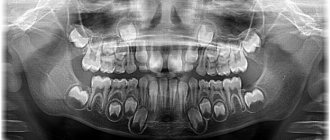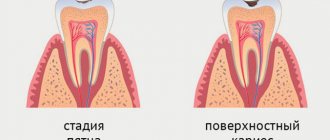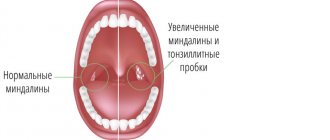There are many reasons for malocclusion, one of them is tongue dysfunction, or its constant incorrect position. Let us tell you in more detail why habits of sticking out the tip of the tongue, bending it, and the like are likely to lead to orthodontic problems.
Is your child sticking out his tongue? This is not a harmless habit, but a problem!
Tongue, nose, throat: everything is interconnected
The inside of a child’s nasopharynx is covered with mucous membrane, which should normally perform a protective function: trap viruses, bacteria, dust particles and other allergens. But if the mucous membrane dries out, it becomes too thin and vulnerable.
Therefore, by the way, the child’s room should be cool and fairly humid.
If the house is hot, the air is dry, the mucous membrane of the nasopharynx dries out, and any virus can easily penetrate through the thinned protective barrier. This causes frequent acute respiratory viral infections associated with a runny nose and swelling of the nose.
Due to these diseases, the child’s nasal breathing is impaired, his mouth is constantly open and his tongue is visible. Gradually, the habit of breathing through your mouth in your sleep arises.
Breathing through your mouth during sleep is a very alarming sign
The mouth opens slightly, expanding space for the tongue. And, of course, the child's tongue begins to take up this additional space in and outside the mouth.
This is how tongue dysfunction arises, then it becomes fixed in the child’s habits.
A vicious circle arises: frequent ARVI - stuffy nose - habit of breathing through the mouth - dry mucous membrane - frequent ARVI, and in addition, tongue dysfunction occurs.
All this can lead to the proliferation of lymphoid tissue, and therefore to adenoiditis and tonsillitis, since it is the nose that filters the air, and when breathing through the mouth, allergens and viruses enter directly into the oropharynx. In this case, the blood is not fully saturated with oxygen and sleep at night is disturbed - in the morning the child gets up sleep-deprived, feels drowsy during the day and cannot concentrate on studies.
Please note: when a child sleeps with his mouth open, this is a very alarming symptom. This habit easily passes into adulthood: snoring, apnea and numerous negative consequences from this occur.
When is there nothing to worry about?
If the baby is cheerful and active, eats well and sleeps peacefully (without throwing his head back), then he is healthy, and his tongue sticks out for one of the natural reasons. You should also pay attention to the color and shape of the tongue - if there is no swelling or white coating, then most likely there is no cause for concern. If parents are alarmed by the protruding tongue of a baby, but there are no visible alarming symptoms, it is better to visit a pediatrician. This way, pathology can be completely excluded, and if it is detected, it can be treated at an early stage. The characteristic symptoms can be found in the photo accompanying the article.
Tongue dysfunction: how it affects teeth
The habit of breathing through the mouth, including during sleep, leads to increased tongue dysfunction. The child begins to stick out his tongue more often (and the tongue is the strongest oral muscle), make additional efforts and press his tongue on the teeth.
What will happen to the teeth if such a habit develops?
- A diastema may form - a gap between the front teeth.
- The contacts of the teeth in the frontal region may be disrupted, then an open bite will appear - a pathology that is quite difficult to correct: it causes noticeable harm to the condition of the teeth, since the entire load falls on the chewing teeth in the lateral regions.
Open bite in a child
- The front teeth can rotate (turn around their axis) or form a protrusion - a forward tilt.
Children's teeth are quite pliable, as the child grows, the size of his jaws and the space in the row of teeth constantly increase. Therefore, the effort exerted by the tongue is quite enough to move the teeth, but they will no longer be able to return back to the correct position on their own.
One more problem
In addition to orthodontic disorders, difficulties with pronouncing sounds will increase. Speech therapy correction is designed for the correct structure of the teeth and the functioning of the tongue, so classes with a speech therapist will be very long and ineffective if the main cause of poor diction is not eliminated.
Nuances that should alert you
Most diseases accompanied by tongue protrusion in infants respond well to treatment, especially if they are identified and treated at an early stage. A protruding tongue rarely acts as the only symptom of the disease (the exception is when the baby constantly shows only the tip of the tongue from the mouth).
Sometimes this phenomenon is perceived as one of the symptoms of dementia, but debility in babies under one year old can only be congenital and is accompanied by specific symptoms that are difficult to confuse with anything. In addition to the fact that the child’s mouth is open and his tongue is sticking out, parents should be alerted to the appearance of one of the following nuances:
- swelling of the tongue,
- dry skin,
- the baby does not pull out his tongue, but sticks it out, cannot keep it in his mouth,
- pale yellow skin
- the child is constantly worried, cries, sleeps poorly,
- baby spits up frequently
- the baby constantly sticks out only the tip of his tongue,
- pulsating and bulging fontanel,
- in a dream the head tilts back,
- there is a white coating on the tongue and in the oral cavity,
- the child’s inability to control his facial expressions.
Tongue keeps falling out of mouth
Why does a child's mouth remain open and his tongue keep falling out? This may indicate that he is suffering from hypothyroidism. The disease develops in children whose mothers experienced iodine deficiency during pregnancy. In modern perinatal centers, tests for hypothyroidism are taken from a child almost immediately after birth.
How to help a child?
It is worth understanding that these habits do not arise on their own and not because of bad behavior. Comments and reminders that you should not stick your tongue out will not work - you need to work with the root cause of the disorder.
- Restore nasal breathing.
Orthodontists often prescribe consultations with an otolaryngologist, since the dental system and respiratory organs are closely connected. Removal of adenoids, treatment of chronic diseases, normalization of the microclimate at home to reduce the frequency of acute respiratory viral infections, hardening and other restorative procedures - all this can be prescribed by a doctor to achieve remission.
ENT can help restore health for proper tongue function
- Contact an orthodontist.
Only in this order, otherwise the treatment will not be effective. As soon as the child is able to breathe with his mouth closed, you can move on to correcting the position of the teeth and tongue.
For this purpose, children's orthodontic devices have been created:
- Plates.
- Trainers.
- Twin Block device.
- Children's aligners Kinder Smile.
All these devices are removable and act quite gently, guiding teeth during the period of their active growth. Wearing requires parental supervision, but with proper use, problems are solved quite quickly - within a few months.
Only after this can you begin classes with a speech therapist - when the malocclusion and the main manifestations of tongue dysfunction are eliminated, the correction of sound pronunciation will be much more successful.
Why does a 2-3 month old baby stick out his tongue?
If an adult's tongue sticks out or falls out, this may indicate excessive enthusiasm for the current activity or the development of a disease such as segmental dystonia. What will cause a child to stick out his tongue?
A baby at the age of 2-3 months sticks out his tongue in order to eat, play, or because he is developing a disease. This may be a sign that the baby is hungry. In this way he tells his mother that it is time to feed him. While eating, the baby opens his mouth and sticks his tongue out to make sucking movements, so when he wants to eat, he makes similar movements reflexively. You need to offer your baby a breast or a bottle - perhaps, after eating, he will hide his tongue. Experts identify a number of reasons (besides hunger) that can lead to a baby sticking out his tongue.
| Category | Causes | Note |
| Natural | A game | Feel the gums, touch the lips, lick the rattle - this is how the baby plays and learns about the world. |
| Copy | If one of the parents entertains the child by making faces and sticking out his tongue, soon the baby will begin to do the same. | |
| Tongue size | At the age of 1-3 months, the tongue is too large, long and simply does not fit into the mouth. This problem resolves itself within six months. | |
| The room is hot | Sticking out his tongue, he tries to cool himself down a little. | |
| Sign of teething | Most babies experience the first signs of teething at 4-5 months of age, but for some, painful sensations in the gums appear a little earlier, sometimes in two-month-old babies. Sticking out his tongue, he moves it along the gums - this is how the baby tries to massage and moisten them a little. | |
| Pathological | Lack of iodine in the body | The symptom may indicate the development of hypothyroidism. |
| Irregularly formed facial muscles/distorted jaw | You must consult a doctor immediately. | |
| Intracranial pressure | In most cases, this diagnosis is made already in the maternity hospital, and the necessary therapy is prescribed there. |
How to wean yourself from this habit?
Three month old baby
The answer to the question “why does the baby bite and suck his tongue” has been received. Now we’ll answer how to wean your baby from this habit.
First of all, you need to distract the child. If the baby is three months old or more, then you can give him a pacifier. It is recommended to buy rubber toys for children during the teething period. The same applies to tongue sucking - instead, give the child a pacifier or toy, wean him off the habit with the help of a distracting conversation, song, or poem.
After 3 months of age, do not swaddle your baby with your hands. During this period of development, children learn about the world around them and themselves - exploring and “tasting” their hands and fingers is natural. If you do not give your child this opportunity, it is quite possible that he will develop the harmful habit of chewing his tongue.
What parents should pay attention to and be wary of
- Breathing through the mouth if the child does not have a runny nose.
- No gaps between teeth by 4-5 years.
Baby teeth are small and there is usually always room for them, even if the jaw has not developed enough. As the child grows up and prepares for a mixed dentition, so-called trema should appear between the baby teeth - small but distinct distances. When baby teeth fall out, permanent teeth will erupt, which are much wider than baby teeth, and they should have enough space for normal growth and the formation of an even, beautiful dentition.
- Observe the child’s swallowing of saliva; normally, swallowing occurs imperceptibly, without tension in the facial muscles.
Usually, during an appointment, a pediatric dentist draws the attention of parents to the emerging problems of forming a correct bite and refers such children to an orthodontist.
If this does not happen, it is necessary to show the child at the age of 4-5 years to a pediatric orthodontist, preferably one who takes into account the functional approach in his work.
Diagnosis of possible problems
To diagnose possible problems, you will need to visit a qualified specialist. An experienced pediatrician will be able to identify the characteristic symptoms of most of the pathologies described above based on an examination of the child and a survey of parents. Almost all pathological conditions that are accompanied by protruding tongue in an infant have specific symptoms.
If you suspect hypothyroidism, you will need additional consultation with an endocrinologist and a laboratory blood test (now this is often done in the maternity hospital). If the doctor suspects that the child is suffering from ICP, he will refer the child for examination to a neurologist. Based on the results of the consultation, neurosonography may be prescribed.
Associated symptoms
Many symptoms of various diseases can accompany tongue chewing. As mentioned above, these are endocrine disorders, infectious diseases, often teething or pathologies of the bite and development of the jaw bones.
In addition to all of the above, this habit can be accompanied by many inflammatory diseases of the oral cavity:
- glossitis - inflammation of the tongue,
- stomatitis - inflammation of the mucous membrane,
- gingivitis – inflammation of the gums.
These pathologies always cause discomfort in babies in the form of itching and pain, so they begin to drown it out by chewing their tongue. A vicious circle is created here - the child bites the tongue, thereby injuring it, which further aggravates the inflammatory process. That is why chewing the tongue itself contributes to the development of diseases.
The child is over 6 months old
For infants under one year of age, the reasons why they stick out their tongue will be the same in most cases. At the age of 6 months and older, children tend to play and make faces more in order to entertain themselves and others and get some exercise.
If a 6-7-8 month old child sometimes sticks out his tongue and immediately hides it, we are talking about a completely natural action. Alarming accompanying symptoms are similar to those presented above.









